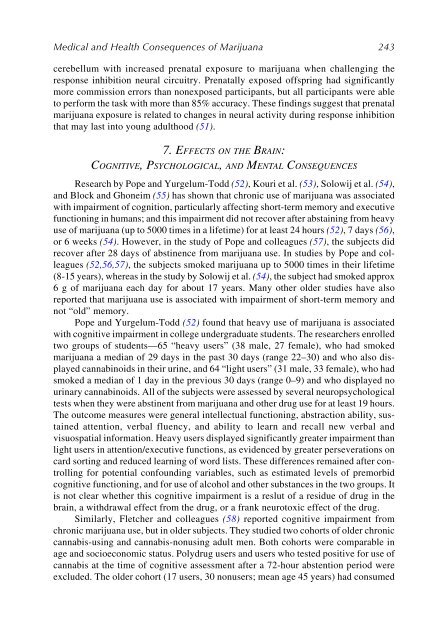Marijuana and the Cannabinoids
Marijuana and the Cannabinoids
Marijuana and the Cannabinoids
Create successful ePaper yourself
Turn your PDF publications into a flip-book with our unique Google optimized e-Paper software.
Medical <strong>and</strong> Health Consequences of <strong>Marijuana</strong> 243<br />
cerebellum with increased prenatal exposure to marijuana when challenging <strong>the</strong><br />
response inhibition neural circuitry. Prenatally exposed offspring had significantly<br />
more commission errors than nonexposed participants, but all participants were able<br />
to perform <strong>the</strong> task with more than 85% accuracy. These findings suggest that prenatal<br />
marijuana exposure is related to changes in neural activity during response inhibition<br />
that may last into young adulthood (51).<br />
7. EFFECTS ON THE BRAIN:<br />
COGNITIVE, PSYCHOLOGICAL, AND MENTAL CONSEQUENCES<br />
Research by Pope <strong>and</strong> Yurgelum-Todd (52), Kouri et al. (53), Solowij et al. (54),<br />
<strong>and</strong> Block <strong>and</strong> Ghoneim (55) has shown that chronic use of marijuana was associated<br />
with impairment of cognition, particularly affecting short-term memory <strong>and</strong> executive<br />
functioning in humans; <strong>and</strong> this impairment did not recover after abstaining from heavy<br />
use of marijuana (up to 5000 times in a lifetime) for at least 24 hours (52), 7 days (56),<br />
or 6 weeks (54). However, in <strong>the</strong> study of Pope <strong>and</strong> colleagues (57), <strong>the</strong> subjects did<br />
recover after 28 days of abstinence from marijuana use. In studies by Pope <strong>and</strong> colleagues<br />
(52,56,57), <strong>the</strong> subjects smoked marijuana up to 5000 times in <strong>the</strong>ir lifetime<br />
(8-15 years), whereas in <strong>the</strong> study by Solowij et al. (54), <strong>the</strong> subject had smoked approx<br />
6 g of marijuana each day for about 17 years. Many o<strong>the</strong>r older studies have also<br />
reported that marijuana use is associated with impairment of short-term memory <strong>and</strong><br />
not “old” memory.<br />
Pope <strong>and</strong> Yurgelum-Todd (52) found that heavy use of marijuana is associated<br />
with cognitive impairment in college undergraduate students. The researchers enrolled<br />
two groups of students—65 “heavy users” (38 male, 27 female), who had smoked<br />
marijuana a median of 29 days in <strong>the</strong> past 30 days (range 22–30) <strong>and</strong> who also displayed<br />
cannabinoids in <strong>the</strong>ir urine, <strong>and</strong> 64 “light users” (31 male, 33 female), who had<br />
smoked a median of 1 day in <strong>the</strong> previous 30 days (range 0–9) <strong>and</strong> who displayed no<br />
urinary cannabinoids. All of <strong>the</strong> subjects were assessed by several neuropsychological<br />
tests when <strong>the</strong>y were abstinent from marijuana <strong>and</strong> o<strong>the</strong>r drug use for at least 19 hours.<br />
The outcome measures were general intellectual functioning, abstraction ability, sustained<br />
attention, verbal fluency, <strong>and</strong> ability to learn <strong>and</strong> recall new verbal <strong>and</strong><br />
visuospatial information. Heavy users displayed significantly greater impairment than<br />
light users in attention/executive functions, as evidenced by greater perseverations on<br />
card sorting <strong>and</strong> reduced learning of word lists. These differences remained after controlling<br />
for potential confounding variables, such as estimated levels of premorbid<br />
cognitive functioning, <strong>and</strong> for use of alcohol <strong>and</strong> o<strong>the</strong>r substances in <strong>the</strong> two groups. It<br />
is not clear whe<strong>the</strong>r this cognitive impairment is a reslut of a residue of drug in <strong>the</strong><br />
brain, a withdrawal effect from <strong>the</strong> drug, or a frank neurotoxic effect of <strong>the</strong> drug.<br />
Similarly, Fletcher <strong>and</strong> colleagues (58) reported cognitive impairment from<br />
chronic marijuana use, but in older subjects. They studied two cohorts of older chronic<br />
cannabis-using <strong>and</strong> cannabis-nonusing adult men. Both cohorts were comparable in<br />
age <strong>and</strong> socioeconomic status. Polydrug users <strong>and</strong> users who tested positive for use of<br />
cannabis at <strong>the</strong> time of cognitive assessment after a 72-hour abstention period were<br />
excluded. The older cohort (17 users, 30 nonusers; mean age 45 years) had consumed


